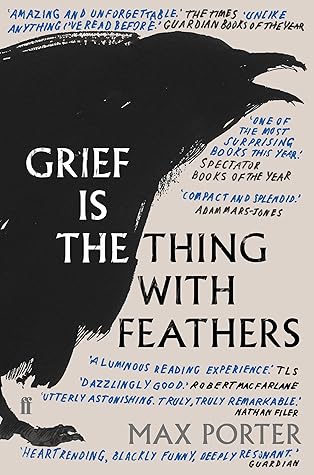More on this book
Community
Kindle Notes & Highlights
I was becoming expert in the behaviour of orbiting grievers. Being at the epicentre grants a curiously anthropological awareness of everybody else; the overwhelmeds, the affectedly lackadaisicals, the nothing so fars, the overstayers, the new best friends of hers, of mine, of the boys. The people I still have no fucking idea who they were. I felt like Earth in that extraordinary picture of the planet surrounded by a thick belt of space junk.
the whole place was heavy mourning, every surface dead Mum, every crayon, tractor, coat, welly, covered in a film of grief. Down the dead Mum stairs, plinkety plink curled claws whisper,
In other versions I am a doctor or a ghost. Perfect devices: doctors, ghosts and crows. We can do things other characters can’t, like eat sorrow, un-birth secrets and have theatrical battles with language and God.
She won’t ever use (make-up, turmeric, hairbrush, thesaurus). She will never finish (Patricia Highsmith novel, peanut butter, lip balm). And I will never shop for green Virago Classics for her birthday. I will stop finding her hairs. I will stop hearing her breathing.
And our Dad forgot what he asked, and Ted Hughes died, and so did our Mum, and my brother tells the Oxford story differently to me.
We seem to take it in ten-year turns to be defined by it, sizeable chunks of cracking on, then great sink-holes of melancholy. Same as anyone, really.
I tell tales of our family friend, the crow. My wife shakes her head. She thinks it’s weird that I fondly remember family holidays with an imaginary crow, and I remind her that it could have been anything, could have gone any way, but something more or less healthy happened. We miss our Mum, we love our Dad, we wave at crows. It’s not that weird.
He was, for two or three years, by all accounts, very odd. He had the perpetual look and demeanour of someone floating, turning in the beer-gold light of evening and being surprised by the enduring warmth. A rolled-over shoulder half-squint half-smile. Caught baffled by the perplexing slow-release of sadness for ever and ever and ever. Which I suppose, looking back, was because of us. He couldn’t rage. He couldn’t want to die. He couldn’t rail against an absence when it was grinning, singing, freckling in the English summer tweedle dee tweedle dum in front of him. Perhaps if Crow taught him
...more
I walked to the shoreline. I knelt down and opened the tin. I said her name. I recited ‘Lovesong’, a poem I like a great deal but she never thought much of. I apologised for reading it and told myself not to worry.


